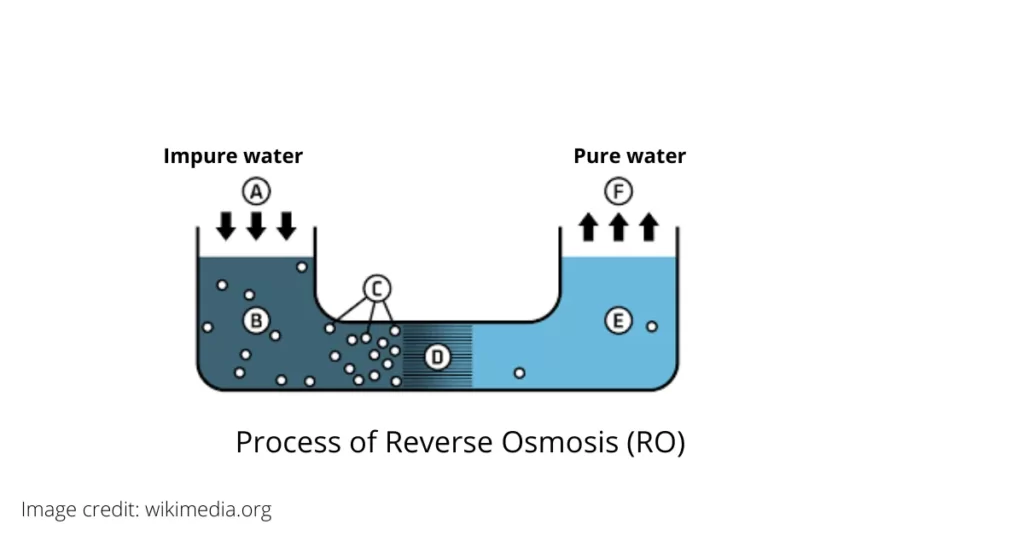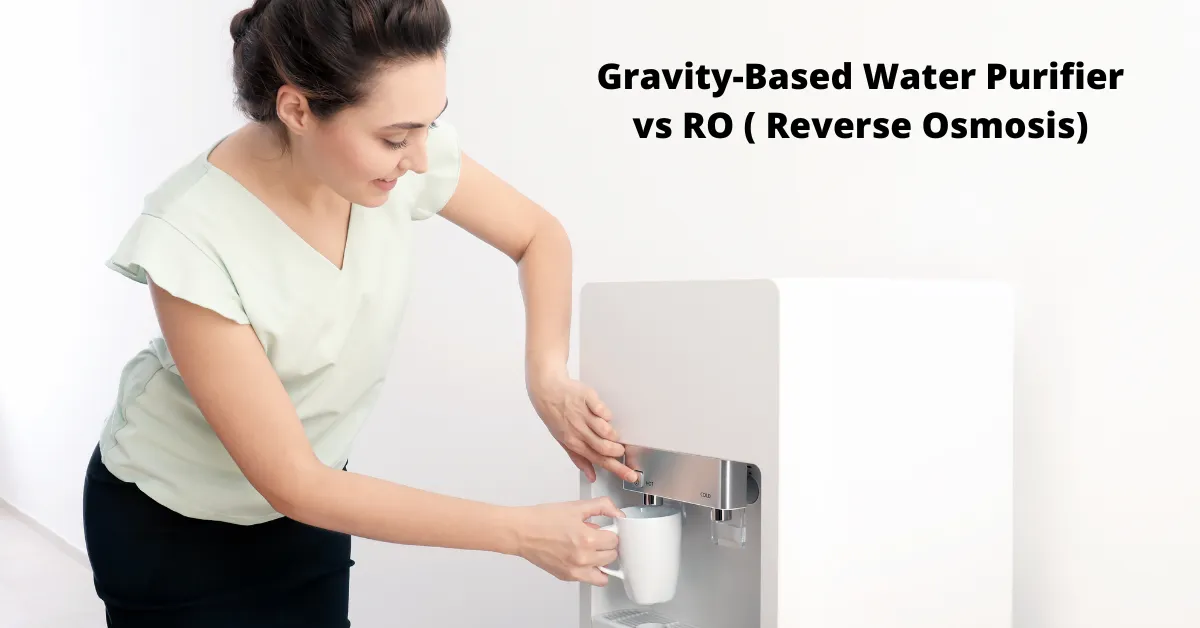Gravity-based water purifier vs RO. Advantages and disadvantages of gravity based water purifier and RO. Water purifier without RO.
Water purification is an essential and necessary process in any home. There are many different methods available to purify water, but which is the best for you? To know the answer you have to first understand the difference between Gravity-based water purifier vs RO.
Let’s check them.
Gravity-based water purifiers use the force of gravity to filter the water while RO (reverse osmosis) filters the water using a semipermeable membrane.RO filters use reverse osmosis to remove all traces of contaminants, including bacteria and chemicals.
What is RO(Reverse Osmosis)?

Reverse osmosis (RO) is a water purification technology that uses a semipermeable membrane to remove ions, molecules, and larger particles from drinking water.
In reverse osmosis, an applied pressure is used to overcome osmotic pressure, forcing water molecules through a membrane against the concentration gradient. RO is commonly used in the production of bottled water and drinking water.
What is Gravity Based Water Filtration?
Gravity-based water filtration systems use the force of gravity to push water through a filter and down into a storage container. The filter removes contaminants from the water as it passes through.
These systems are simple and affordable, making them a popular choice for home use.
What is Gravity ?
Gravity is a natural phenomenon that attracts objects towards the center of the Earth. It is the force that enables us to stand on the Earth and prevents us from being pulled into space. In this act, whatever is upward is pulled down with attraction called gravity.
For example, if we throw something upward it will come down due to the fore of gravity. Because of gravity water always flows downwards from upwards.
Difference Between Gravity-Based Water Purifier vs RO ( Reverse Osmosis)
There are a few critical differences between gravity-based water purifiers and RO (reverse osmosis) systems. Gravity-based systems rely on the natural process of gravity to filter water, while RO systems use a mechanical filtration process to remove contaminants.
Gravity-based systems are also typically much cheaper than RO systems. However, RO systems are more effective at removing contaminants from water and can be used to produce higher quality drinking water.
Gravity Based Water Purifier: Advantages
1. Gravity-based water purifiers are pocket-friendly
Gravity-based water purifiers are very affordable, making them a popular choice for those on a budget. Gravity-based water purifiers work by using the force of gravity to push water through a filter, which removes contaminants and makes the water safe to drink.
These purifiers are very easy to use, and they typically require no installation or maintenance. Additionally, gravity-based water purifiers are relatively compact, making them ideal for small spaces.
2. They are easy to set up, use and transport
Gravity-based water purifiers are easy to set up and use. Many models are portable, so they can be taken with you on camping trips or other outdoor adventures.
Gravity-based water purifiers work by using the force of gravity to pull water through a filter. This type of water purifier is a good choice if you need a reliable way to purify water while you’re on the go.
3. Runs without Electricity Or Power
Gravity-based water purifiers do not require any electricity or batteries, making them a great option for those who live off the grid or in areas without reliable access to power.
Instead, these purifiers rely on the force of gravity to push water through a filter and down into a storage container. This makes them a great choice for campers, hikers, and other outdoor enthusiasts who want a reliable way to purify their drinking water.
We Have the List of Top Gravity Water Purifier : Chek Below
Gravity Based Water Purifier: Disadvantages
There are a few drawbacks to using gravity-based water purifiers.
1. Can be bulky and difficult to move around
Gravity-based water purifiers are often bulky and difficult to move around, which can be a problem if you need to transport the purifier to another location.
2. Requires a lot of space to work properly
Additionally, these purifiers can be challenging to set up, and they may not be suitable for smaller spaces.
3. Can be slow to filter water
Gravity-based water purifiers work by using the force of gravity to push water through a filter. This type of water purifier can be slow to filter water, which can be a disadvantage if you need clean water quickly.
RO (Reverse Osmosis): Advantages
1. RO removes a wide range of contaminants from water
RO filters can remove particles as small as .001 microns in size. This makes them effective at eliminating contaminants like dissolved solids, bacteria, viruses, and chemicals from water.
2. RO is an effective way to purify water for drinking and other household uses.
RO is a process that uses a semipermeable membrane to remove contaminants from water. The water is forced through the membrane under pressure and the impurities are left behind. This process is effective at removing particles, chemicals, and bacteria from water.
3. RO produces high-quality water that is safe to drink and use in the home.
RO systems produce high-quality water that is safe to drink and use in the home. The water is filtered to remove chlorine, sediment, and other contaminants, and it is then passed through a reverse-osmosis membrane that eliminates most of the dissolved minerals. This leaves you with pure water that is perfect for drinking, cooking, and cleaning.
4. RO systems are easy to operate and maintain.
RO systems are easy to operate and maintain because they have a simple design. The system only requires you to fill the tank with water and turn on the machine. The machine will then filter the water and dispense it through the faucet.
RO(Reverse Osmosis): Disadvantages
1. Expensive to Install and Operate
RO systems can be expensive to install and operate. The initial cost of an RO system is high, and it can be prohibitive for some homeowners.
2. Requires a reliable water supply and regular maintenance
In addition, RO systems require a reliable water supply and regular maintenance. If the water supply is not reliable or if the system is not correctly maintained, the RO system may not work properly.
Frequently Asked Questions (FAQs) on Gravity-Based Water Purifier vs RO
Are gravity based water purifiers good?
There is no one-size-fits-all answer to this question, as the best water purifier will depend on your specific needs and preferences. That said, gravity-based water purifiers can be a good option for many people, as they are simple to use and affordable.
Is RO water good for health or not?
RO water is not necessarily bad for your health, but it may not be as good for you as regular tap water. RO water is missing many of the minerals that are naturally found in water, which can lead to mineral deficiencies over time.
Does gravity filter reduce TDS?
Yes, gravity filters can reduce TDS levels. The amount of reduction depends on the specific filter and how it is used. Typically, gravity filters can reduce TDS levels by up to 50%.
What can I use instead of RO?
There are a few options for water filters that can replace reverse osmosis. One option is a pitcher filter with an activated carbon filter. This filter will remove chlorine and some other chemicals from the water, but it will not remove fluoride. Another option is a whole house water filter. A whole house filter will remove chlorine, sediment, and some other chemicals from the water, and it may also remove fluoride. Finally, you can use a gravity-based water purifier.
Conclusion
In conclusion, gravity-based water purifiers and RO systems are both great options for purifying your water. However, the best choice for you will depend on your specific needs and preferences.
If you are looking for a low-maintenance, budget-friendly option, a gravity-based water purifier is probably the best choice for you. On the other hand, for a more high-tech option that can purify water from all sorts of contaminants, an RO system is likely a better choice.
You can Check: Best Hot and Cold Water Purifier in India : Buyer’s Guide
